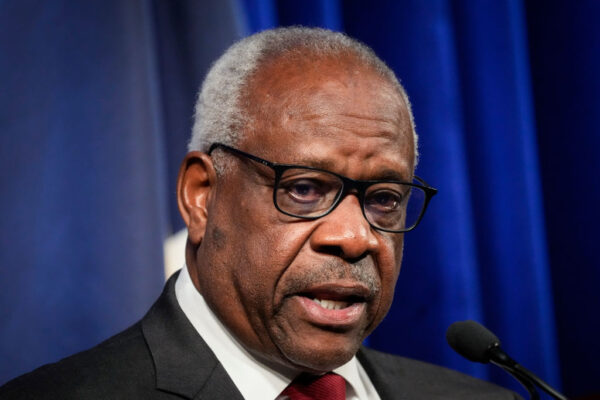Justice Clarence Thomas has been slammed for a nearly 50-page dissent he composed on the Supreme Court’s surprise ruling on a congressional redistricting case in Alabama that will safeguard a part of the Voting Rights Act.
The 5-4 ruling from the conservative-majority court will force Alabama lawmakers to draw lines for a new congressional district that is majority Black. That district will be the second majority-Black congressional sector in the state.
In the case at the center of the decision, Allen v. Milligan, the plaintiffs argued that Alabama lawmakers drew a redistricting map in 2021 that unfairly distributed and disenfranchised minority voters. Alabama civil rights groups and Black voters filed two lawsuits seeking the formation of a new minority district, which was granted in the high court’s new ruling. Justices decreed that the Alabama electoral map violates Section 2 of the Voting Rights Act of 1965, which bars election practices that discriminate on the basis of race.

Conservative Justices John Roberts and Brett Kavanaugh joined the court’s liberals in the opinion. The court’s other conservatives, including Justices Clarence Thomas, Samuel Alito, Neil Gorsuch, and Amy Coney Barrett were the dissenting votes.
Thomas, joined in part by those three other justices, released a lengthy opinion that the court misinterprets Section 2 of the Voting Rights Act. He said the law doesn’t apply to redistricting cases and that the ruling closely considered race in the drawing of district lines.
Thomas wrote the 1965 Voting Rights Act doesn’t require Alabama to “intentionally redraw its longstanding congressional districts so that black voters can control a number of seats roughly proportional to the black share of the State’s population.”
“If it did, the Constitution would not permit it,” he wrote. He even noted that he would have ruled that the Voting Rights Act had no power to prevent state lawmakers from racial gerrymandering and diluting the power of minority voters.
Thomas wrote that Section 2 “replaces the constitutional right against intentionally discriminatory districting with an amorphous race-based right to a ‘fair’ distribution of political power, a ‘right’ that cannot be implemented without requiring the very evils the constitution forbids.”
He also wrote that the act is “nothing more than a racial entitlement to roughly proportional control of elective offices…wherever different racial groups consistently prefer different candidates.”
Clarence’s dissent has drawn the ire and backlash of many on social media.
Ahead of next year’s general election, Alabama legislators will have to go back to the drawing board, so to speak, and redraw voting district lines for seven majority-Republican districts. According to The Associated Press, this decision could potentially shift the power dynamic within a closely-divided U.S. House of Representatives and set a strong precedent for other states. Alabama and Louisiana could introduce new maps that allow Democratic-leaning Black voters to elect their preferred candidates in two more congressional districts.
Similar cases have surfaced in Louisiana, Texas, and Georgia that are vying for the drawing of more majority-minority districts.
Alabama drew its first majority-Black district in 1992, and even litigation was needed then to institute that district. Census data shows that more than 26 percent of Alabama’s population is Black.
In 2013, the Supreme Court voted 5-4 to declare part of the Voting Rights Act unconstitutional in the Shelby County v. Holder case. Section 5 of the VRA required certain jurisdictions with a history of discriminatory voting practices to receive permission from the federal government before implementing changes in voting procedures, according to the Constitution Center. This process was known as “preclearance.” Section 4(b) contains a formula used to determine which jurisdictions are subject to the preclearance and Section 4(a) allowed some jurisdictions that made progress in ending discriminatory practices to forego the preclearance process.
The decision in 2013 declared Section 4 unconstitutional, which cleared the way for the passage or implementation of many voter laws, including the since-revised 2011 Texas voter ID law and other measures restricting poll hours, early voting, and pre-and same-day registration. Thomas voted with the majority.
In 2021, Thomas also voted in the majority 6-3 ruling to scale back part of the Voting Rights Act that would allow Arizona to maintain voting restrictions the state instituted following the 2020 presidential election, like banning the collection of absentee ballots by anyone other than a relative or caregiver and discarding any ballots cast in the wrong precinct. A federal appeals court found both provisions discriminatory against minority voters and unjustifiable since there was no evidence that fraud was a risk, but the Supreme Court ruled to reinstate the measures.
Thomas has recently been at the center of a fresh scandal connected to his ties to wealthy GOP donor Harlan Crow, who apparently gave lavish gifts and financed luxury vacations for the justice.


